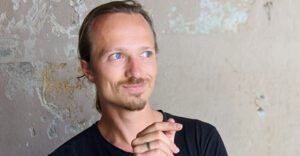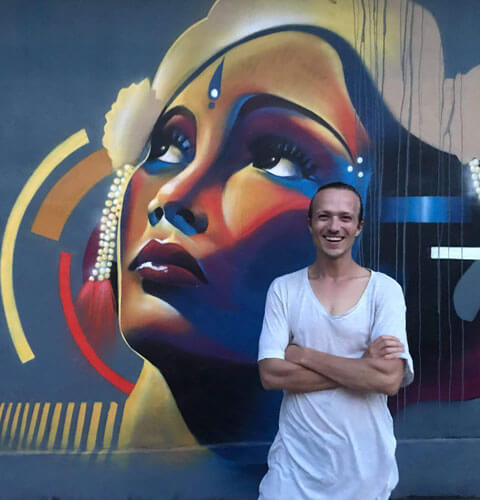Gui Perdrix is a Coliving Expert, Community Building Consultant and Author on the subjects of coliving, community and connection. Gui currently stirs the coliving industry by being the Director of Co-Liv, the global association of coliving professionals, which represents and empowers coliving players through events, membership services and educational content. Gui is also the founder of Art of Co, an educational platform dedicated to creating transformative coliving experiences. It is his passion for human dynamics that lead him to constantly ask the question of how to create better frameworks for human flourishing, which constantly drives him to accomplish more every day.
Gui Perdrix is of French descent but was born and raised in Germany, next to Frankfurt. Gui recalled, “I grew up in a small town of 30,000 people.”
His life-altering moment happened when he was relatively young. Talking about the incident, he says, “When I was 14, I went to Peru and South America for an exchange program. And, that really shaped me in many ways, especially because there was a huge cultural difference between Latin American culture, which is very open and friendly and German culture, which is usually pretty close, especially in the area where I was born. And since then, I knew I wanted to leave Germany as soon as I finished high school.”
After completing high school, Gui shifted to France and continued his education at Sciences Po, and also earned a Bachelor’s Degree at the University of Southern California. His first job was at a startup, in a marketing role based in London. He then worked at several other startups before co-founding an innovation/co-working space in Paris.
Shortly after, Gui had a breakdown that changed the course of his life for the better. He quit his job and decided to go to Barcelona for a one-month personal growth program. Unfortunately, he did not have the financial means to go for it, so confided in his friend who was accompanying him. His friend encouraged and motivated him to do it, and Gui was convinced. When they got to the place, they realized that several others also faced a similar predicament and did not have any accommodation. So in approximately two weeks, they gathered 15 people who wanted to live together, collected the payments, and found a big apartment that could accommodate all of them comfortably. They named the place a lifestyle engineering house.
That was the first Co-living space that Gui created. This incident greatly impacted Gui since it was the first time he succeeded in an entrepreneurial project. It also gave him a chance to acquire more knowledge and wisdom regarding personal understanding and self-discovery. This experience made him want to create more of these spaces across the globe.
Gui then gradually moved into the Co-living sector. When discussing what drew him to become a nomad, he said, “The Nomad culture comes from a friend of mine, Carl, he was also one of the co-founders of my first Co-living space. He is an independent person with no restrictions on location. He is a nomad, and I truly wanted to experience that level of freedom.” that led him on this path.
Gui reminisces fondly; he says, “In the first two years of Co-living, I didn’t do it for profit; it was a fun project. And personally, it was me having a great life and living to the fullest.”
According to him, the concept of Co-living is when there are more than two people who do not belong to the same family and share a place with common amenities. He goes on to further explain, he says, “I think there are different forms of Co-living for example, student housing and senior housing can also be included in this category. And different markets as well, when you look at Europe, the Co-living offerings are very different than in India. The experience in the latter is flexible, offering ease and affordability. While in Europe, it caters to a mid size income population that is going through a phase in their life where they want to stay in a Co-living space for about 12 to 18 months.”
Co-living as a concept goes beyond just a fun experience. Gui explains, “it creates interaction with people that you usually would not interact with that means there will be more instances where people will get uncomfortable and triggered. And the question is how to get over them. So it is going to create experiences and memories, but also challenges.”
He further says, “for instance, if I meet somebody in the bar, then I may see them again maybe once, and then I might text them. And we will probably see each other once a month. And that’s it. However, if I live with somebody for about four months, I will see them every day. So the amount of interaction and the amount of alignment that gets created is much more substantial. So it puts you in new situations that you haven’t been in before and teaches you how to deal with people you wouldn’t deal with usually, and teaches you to be more empathetic.”
To explain the concept of Co-living to the masses, Gui is currently working on his new book, The Art Of Co-living, which will be published soon. Talking about the book, he said, “It’s two years of research and talking to more than 200 organizations around how to create great Co-living spaces. And to me great means spaces that are meaningful to people, and that enhance lives.”

The book has different categories ranging from how to create Co-living spaces to business models. However, the book’s primary emphasis is on building communities, finding the right residents, creating a culture within the space, giving residents autonomy, and developing independent communities.

As a master of ambiguity, Gui’s advice to the entrepreneurs entering uncharted waters is, “The number one question you should be asking yourself is why do you want to do that? What is the change that you want to bring into the world? And then explore, talk to people and figure out your alignment with the opportunity that you seek.”







